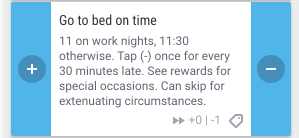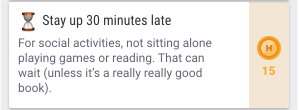The basic tenets of good sleep hygiene are pretty well established, but actually following through with them is a different story altogether. Sure, I know that I should stay away from screens before bedtime and go to bed and wake up around the same time each day, but actually having the discipline to follow that advice isn’t that easy.
Although some may say that technology is at least partly to blame for these problems in the first place, I’ve been able to use technology to help me get to bed on time. And while I definitely have room to improve in other areas of sleep hygiene, I thought I’d share what I’ve learned so far in case anyone is struggling with this.
No excuses for losing track of time
One of the big problems I was having was losing track of time. I’d start reading something, and before I knew it, it was midnight (or later). My first step in training myself to observe a better sleep schedule was to eliminate any excuse for losing track of time by setting an alarm on my phone for when I needed to start getting ready for bed.
I don’t use this method anymore, but if you want to start small and spend zero money, it’s not a bad place to start. Sure, it was a little embarrassing if I was at a friend’s house and the alarm went off, but it was also a good reminder that maybe it was time to go home. At least I couldn’t say that I had no idea how late it was anymore!
One problem with this method was that it was very abrupt. I might be in the middle of something, and then the alarm would go off, and it was tempting to just finish what I was doing before making moves toward the bed. Since the alarm wouldn’t go off again, it could be easy to forget about it altogether and stay up too late. The abruptness also meant that I was trying to transition into getting ready for bed when I often wasn’t feeling tired at all. I didn’t know it yet, but I needed a better solution.
Using smart bulbs to cue your brain for bedtime
The answer actually came out of my search for a better alarm clock. I mentioned that I wanted to get one of the clocks that gradually fill the room with light, mimicking a sunrise, and my now-fiancé suggested that I just get some smart bulbs instead and program them for the same effect (more on that further down).
I bought a pack of Philips Hue bulbs (the plain white ones), and I was so pleased that I bought some more to put in my living room. I programmed the ones in my living room to gradually fade to off, starting one hour before the time I wanted to go to bed.
This works great as a signal that it’s time to start winding down. First of all, provided that you don’t cheat and turn the lights back up to 100%, there’s no ignoring it. If you don’t make a move, you’re going to be sitting in darkness. What I find really helpful is that the fading light also makes me feel sleepy and more willing to go to bed. I’ve also set my bedroom lights to a dim setting around the time when I’ll be getting ready for bed, so that I’m not jarred back awake by bright lights when I move into the bedroom, but can still see enough to get ready.
The one thing I don’t like about this system is that the lights fade very suddenly—from 100% to about 80% immediately, and then the remaining way to 0% over the course of the hour. This sudden start is the same for having the lights turn on in the mornings as well. It didn’t always work this way—it started after an update in the past year or so. I’m not sure if this is any better with the other Philips bulbs (like the ambient whites or the multi-colored), so if you have any experience with those, please let me know in the comments!
Using a habit tracker for accountability

This past year, I was introduced to Habitica by my friend Mercer, who also introduced me to Duolingo and Passion Planner, recommended my blender, and whom I am, in general, proud to know.
Habitica is a habit-tracking RPG, where good habits can earn you XP and gold, while bad habits can cause your character to lose health. It’s been really helpful for me, although I’m still working out how to get the most out of it. I plan to write more about that in a separate post, but for now, let’s look at how I’ve been using it to get to bed on time.
I started off by creating a habit called “Go to bed on time”, with some instructions for myself in the description. It was pretty simple—I’d tap on the “+” if I went to bed on time, and the “-” if I didn’t. Most of the time, I did ok, but when I didn’t, there was no incentive to go to bed as soon as possible. If I’d already docked points for staying up late, I might as well stay up as long as I wanted.
Another problem was that I straight-up ignored it a lot of the time. I’d added a note to the description saying that I could skip that habit on special occasions, and I found myself counting a lot of situations under that category. Sometimes I really didn’t want to punish myself for staying up late, such as if I were out on a date with my fiancé, but I didn’t want it to get out of hand either.
The solution I came up with had two parts. First, I decided to switch to an incremental approach rather than a binary one. Instead of just tapping “-” once if I stayed up past my bedtime and then being done with it, I’d tap it once for every 30 minutes late that I stayed up. While I do still stay up past my bed time many nights (adding more things to my nightly routine hasn’t helped with that), it’s very rare now for me to stay up more than 30 minutes late. So, even though I don’t always go to bed at exactly the same time, this strategy has helped me be more consistent overall.

The other problem, you may recall, is that I was ignoring the habit too often for “special occasions.” To handle that scenario, I decided to use Habitica’s “Rewards” feature to create a custom reward for myself. While bad habits cause damage, rewards are purchased with the gold you earn through good habits. I decided that if I was staying up late to do something enjoyable and worthwhile (hanging out with friends, maybe reading one last chapter of a really good book), I can purchase a reward—again, 30 minutes at a time—instead of docking points for a bad habit.

There are still occasions where I would skip the habit altogether, but those are few. Now that I have an option for treating extra time as a reward, I track it in some form nearly every night, which helps me keep it under control.
Good habits add up
After using both the smart bulbs and Habitica for a while now, I’m finding it easier to stick to my bed time (or at least within 30 minutes of it) even when I’m away from home. I’m far less tempted to stay up until midnight these days—although that could just be because I’m getting older!
I’m always thinking about these habits and strategies and how I can make them better. For example, although I’ve currently set my bedtime as 11, I’m considering moving it to 11:30. I’ve been missing the 11pm mark a lot lately, but I almost always make it to bed by 11:30, so it seems like it might be a more realistic goal, and should still provide me with plenty of sleep.
What about mornings?
I’m not a morning person, and I’m still struggling in this regard. As I mentioned previously, I have my bedroom lights set to gradually start turning on, starting 15 minutes before my alarm goes off (which I set to use the sounds of bird chirping, to continue with the theme of a more natural wake-up process). I do think that these changes have helped me to wake up more gently, with less stress. I do not, however, think that they have helped much in actually getting me out of the bed sooner.
I’m still trying to figure out how to improve this, because I think I could be getting a lot more done in the mornings than I currently am. I’ve considered making a habit in Habitica for getting out of bed by a certain time, or a negative habit for pressing the snooze button. I’ve also thought about focusing on creating a new habit, one that wouldn’t be directly related but that would encourage me to get out of bed, such as doing yoga every morning. I used to actually do that, but somehow yoga started getting replaced with lying in bed longer and never made a comeback. If I land on a strategy that helps, I’ll share it here!
Of course, there’s also the possibility that I’m going about this all wrong. Maybe I should just stay up late and sleep late. My job is flexible enough that I could probably sleep in an extra 30-60 minutes each morning, if I chose. There would even be some advantages to pushing back my work schedule. I haven’t ruled out that possibility, but I’d be concerned about it getting out of hand. For now, I’m going to keep trying to get out of bed by 8 each morning (which, let’s be real, is not exactly the crack of dawn).
If you have any tips on motivating yourself to get out of bed earlier, I’d love to hear them!